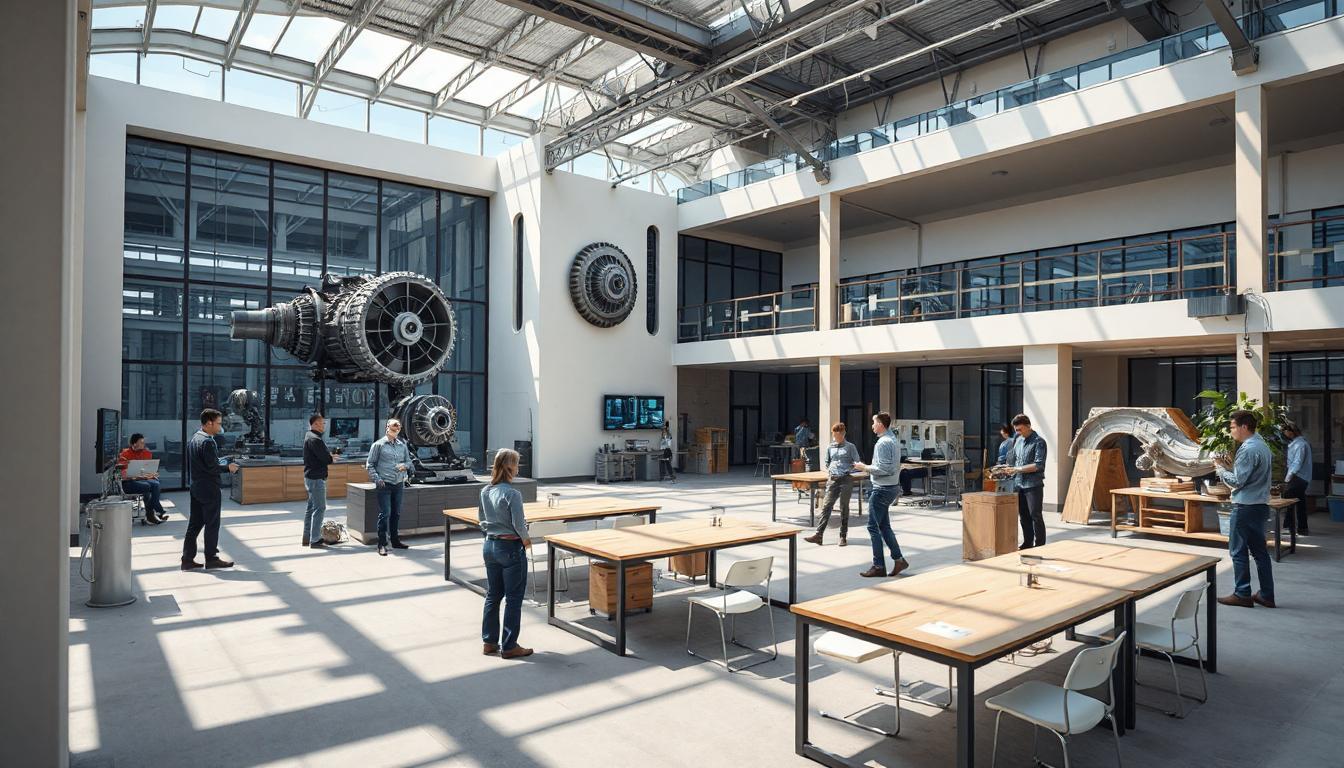Future of Mechanical Engineering: What Mechanical Engineering Institutes Teach in 2025

Mechanical engineering is evolving faster than ever. As industries embrace automation, smart manufacturing, and sustainable technologies, Mechanical Engineering Institutes are upgrading their curriculum to keep pace. The future belongs to mechanical engineers who are not only technically sound but also proficient in AI, robotics, and interdisciplinary innovation.
In 2025, mechanical engineering education is no longer limited to machines and mechanics. It is an ecosystem of emerging technologies, digital tools, and hands-on learning experiences designed to shape the engineers of tomorrow.
In this blog, we’ll explore how Mechanical Engineering Institutes—including top-rated ones like MCSGOC (Dr. M.C. Saxena Group of Colleges)—are redefining mechanical engineering in 2025. We’ll dive deep into the new curriculum, emerging specialisations, digital integration, and how institutes are preparing students for Industry 5.0.
Table of Contents
-
Evolution of Mechanical Engineering: A Quick Recap
-
What’s New in Mechanical Engineering Education in 2025
-
Top Technologies Now Integrated into the Curriculum
-
Project-Based & Industry-Oriented Learning
-
Role of AI & Machine Learning in Mechanical Engineering
-
Sustainability & Green Tech: New Priorities
-
Interdisciplinary Learning & Hybrid Skill Sets
-
How Institutes Like MCSGOC Are Leading the Change
-
Future Career Opportunities for Mechanical Engineers
-
Why Mechanical Engineering Still Has a Strong Future
-
FAQs
1. Evolution of Mechanical Engineering: A Quick Recap
Mechanical engineering is one of the oldest and most fundamental branches of engineering. Traditionally, it focused on the design, manufacturing, and maintenance of mechanical systems. Key subjects included thermodynamics, fluid mechanics, heat transfer, kinematics, and machine design.
However, the digital age demanded more than just traditional knowledge. The transition from Industry 3.0 (automation) to Industry 4.0 (cyber-physical systems) and now to Industry 5.0 (human-centric, AI-integrated manufacturing) required mechanical engineers to adapt fast.
2. What’s New in Mechanical Engineering Education in 2025
In 2025, the shift in education is very apparent. Mechanical Engineering Institutes have transformed their approach to teaching, focusing more on:
-
Outcome-based education
-
Skill-driven modules
-
Collaborative learning
-
Research-based pedagogy
-
Industry-aligned internships
The curriculum has moved away from rote learning to encourage innovation, entrepreneurship, and sustainable thinking.
3. Top Technologies Now Integrated into the Curriculum
The biggest leap has come from the inclusion of emerging technologies. Today, mechanical engineering students work with tools and systems that were once considered futuristic:
-
CAD/CAM with AI plugins
-
Digital Twins for real-time machine simulation
-
Smart materials and 3D printing
-
IoT-integrated sensors and actuators
-
AI-based predictive maintenance
-
Robotics and autonomous systems
-
Data analytics for thermal systems
These innovations are helping students grasp real-world complexities early in their education.
4. Project-Based & Industry-Oriented Learning
Mechanical Engineering Institutes in 2025 promote learning-by-doing. Rather than focusing solely on theoretical exams, institutes like MCSGOC emphasize:
-
Capstone projects with live industry problems
-
Internships with manufacturing giants and R&D labs
-
Hackathons and tech fests focused on automation and green tech
-
Student participation in SAE, BAJA, and Formula competitions
-
Collaborative projects across departments
This hands-on approach ensures that students graduate with relevant experience and exposure.
5. Role of AI & Machine Learning in Mechanical Engineering
In 2025, artificial intelligence is not just an IT domain—it is deeply embedded into mechanical engineering systems. From predictive analytics for maintenance to AI-powered control systems in robotics, students are taught:
-
Basics of neural networks & machine learning algorithms
-
AI integration with mechanical sensors and PLCs
-
Data-driven optimization of HVAC, turbines, and engines
-
Mechatronics combining electronics, AI, and mechanics
Mechanical Engineering Institutes ensure students can code in Python, MATLAB, and integrate with platforms like Siemens NX and Ansys Fluent.
6. Sustainability & Green Tech: New Priorities
Environmental awareness is a key theme in 2025. Engineering curricula are adapting by integrating green engineering practices such as:
-
Renewable energy systems (solar, wind, geothermal)
-
Sustainable design & life cycle assessment
-
Carbon footprint analysis
-
Energy-efficient machines
-
Eco-friendly materials and manufacturing
Institutes are even setting up green labs, solar-powered projects, and partnerships with sustainability-driven companies.
7. Interdisciplinary Learning & Hybrid Skill Sets
Today’s mechanical engineer is expected to be a blend of:
-
Mechanical expertise
-
Electrical understanding
-
Programming skills
-
Data science know-how
-
Design thinking abilities
That’s why institutes offer cross-discipline electives like:
-
Industrial IoT
-
Blockchain for manufacturing logistics
-
VR/AR for machine visualization
-
Computational mechanics
This hybrid learning makes graduates more employable and agile.
8. How Institutes Like MCSGOC Are Leading the Change
Among the top Mechanical Engineering Institutes, MCSGOC stands out in 2025 due to:
-
AI-integrated mechanical labs
-
Dedicated Center for Robotics & Mechatronics
-
Collaborations with companies like Bosch, Tata, and Siemens
-
Customizable electives in renewable energy, additive manufacturing, etc.
-
Entrepreneurship cells and innovation incubators
MCSGOC also emphasizes personality development, soft skills, and placement training to make students job-ready from day one.
9. Future Career Opportunities for Mechanical Engineers
With these changes, mechanical engineers are not limited to factory jobs. New-age opportunities include:
-
AI-powered product development
-
Smart city infrastructure design
-
Autonomous vehicle systems
-
HVAC & green building consulting
-
Aerospace and drone technology
-
3D printing specialist
-
Industrial robotics engineer
-
Energy systems auditor
Startups, MNCs, R&D labs, and even government bodies are actively hiring hybrid-skilled mechanical engineers.
10. Why Mechanical Engineering Still Has a Strong Future
Despite the rise of IT and software engineering, mechanical engineering remains indispensable. Machines still need to be designed, built, optimized, and maintained—now with smarter, more sustainable systems.
Mechanical Engineering Institutes are not just keeping up—they’re ahead of the curve in 2025. With the right training and vision, mechanical engineers are well-positioned to lead the next wave of innovation in India and globally.
11. FAQs
Q1. What are Mechanical Engineering Institutes focusing on in 2025?
A: Institutes now focus on AI, robotics, sustainability, and interdisciplinary learning.
Q2. Which institute is best for mechanical engineering in Lucknow?
A: MCSGOC is among the top-ranked Mechanical Engineering Institutes in Lucknow.
Q3. What technologies are taught in mechanical engineering today?
A: Students learn 3D printing, AI, IoT, robotics, CAD, and more.
Q4. Can mechanical engineers work in software fields?
A: Yes, with added programming and data skills, many work in automation, AI, and software domains.
Q5. Is mechanical engineering still a good career in 2025?
A: Absolutely! It offers diversified roles in smart manufacturing, energy, and R&D.
Q6. What kind of projects do students build in 2025?
A: AI-controlled vehicles, energy-saving machines, robotic arms, drone components, etc.
Q7. How has the curriculum changed in recent years?
A: It now includes outcome-based education, tech integration, and industrial exposure.
Q8. Are internships mandatory in 2025?
A: Most Mechanical Engineering Institutes have made internships and capstone projects mandatory.
Q9. What are the career options after a mechanical engineering degree?
A: Robotics engineer, design analyst, automation expert, renewable energy consultant, and more.
Q10. What programming languages do mechanical engineers learn?
A: Python, MATLAB, C++, and languages used in robotics and simulations.
Q11. How does MCSGOC support mechanical students?
A: With AI-integrated labs, industry collaborations, innovation hubs, and 100% placement training.
Q12. Are there specialisations within mechanical engineering now?
A: Yes, like mechatronics, smart manufacturing, AI-integrated design, and sustainability.
Q13. What tools do students use for simulations?
A: Ansys, SolidWorks, AutoCAD, Siemens NX, COMSOL, and more.
Q14. Are there startup opportunities for mechanical engineers?
A: Absolutely. Many work on innovations in robotics, green tech, and IoT-based devices.
Q15. Will automation reduce jobs for mechanical engineers?
A: No. It creates new roles needing advanced knowledge in automation, controls, and data science.
Final Thoughts
Mechanical engineering is no longer what it used to be. It’s smarter, greener, and digitally empowered. Mechanical Engineering Institutes like MCSGOC are equipping students with the skills to thrive in 2025 and beyond.
If you’re passionate about designing, innovating, and solving real-world problems—mechanical engineering in 2025 offers endless possibilities.






